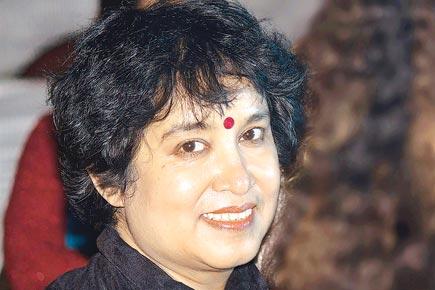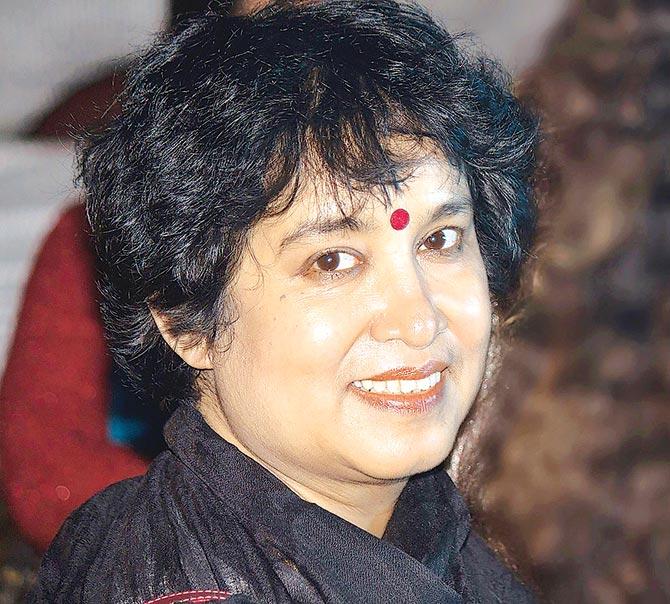Taslima Nasreen talks about how she was made to leave Kolkata

Taslima Nasreen

Taslima Nasreen
ADVERTISEMENT
After she had to leave her country of birth, Bangladesh, in 1994, Taslima Nasreen spent a decade in Europe. She found a place she could call "home" again in Kolkata from 2004-2007. But in 2007, after violent protests from Islamic fundamentalists she was forced to leave the city and eventually had to leave the country too.
Her book, Dwikhondito (loosely means divided into two) had riled fundamentalists as they claimed that sections in the book criticised the Prophet. A fatwa was declared and a price put on her head. What surprised and disappointed her more, though, was that an influential section of the writers' community, too, had been vitriolic about Dwikhondito and some even compared her to a sex worker, in print. Subsequently, a group of 25 intellectuals were picked to decide the fate of the book by the then Left Front government and they had agreed to ban the memoir.
"I was shocked that a progressive Left government sided with fundamentalists against a persecuted writer," says Nasrin, currently in New Delhi and after a pause adds, "The Left is supposed to champion secularism and freedom of speech, right?" Since then, nearly a decade has passed and the ruling party in West Bengal has changed, but Nasreen does not have much hope of returning to where she longs to be.
"I am a Bengali, I love to live in Kolkata. It is my second home. But I do not have much hope of returning there. Nothing much has changed after the change of government. The Trinamool Congress government has shown no inclination to get me back," she says.
She reminded that the launch of her autobiographical book, Nirbashan, had to be cancelled at the Kolkata book fair in 2012 at the last hour. (The book has now been translated into English as Exile, by Maharghya Chakraborty, a PhD scholar at Centre for Studies in Social Sciences and published by Penguin.)
In 2013, a television serial (Dusahobas) she had written was shelved by the channel under pressure. "Persecuted writers have got support and refuge when governments changed but in my case neither the change in government in Bangladesh with Khaleda Zia coming to power or the change of government in West Bengal has meant anything," she says.
Though her writing has chiefly riled the Islamic fundamentalists, Nasreen has been critical of other religions and powers. In Exile, she mentions how in 2005, she was booed off the stage at an event of the North American Bengali Conference in New York City, when she read out her anti-war poem, America. "If RSS or any group agrees with what I say, it is not my fault,'' she explains.
To explain, she states her support for Uniform Civil Code currently being debated. "Uniform Civil Code is a progressive idea. Just because I support that, does not mean I have become BJP. I have always stood by secular principles but I fail to understand secular groups that can see the persecution of minorities but cannot see the persecution of minority women. I consider such people hypocrites," she says.
Recently, she has also been busy on Twitter, voicing her opinion and countering claims on her name. "I now have a verified account and challenge lies spread in my name. On social media, I get abused by all kinds of religious fundamentalists. I guess that makes my stand clear," she explains.
Living a life under fatwas and threats for her writing for over 25 years now, Nasreen has no plans to stop. "I know my limitations. I am no Tolstoy or Gunter Grass. I am a socially conscious writer who has to keep writing however much the space and opportunity shrinks. (Only a few Bengali publications now publish her and the rare ones in Bangladesh with risk of violence) If all stops, I will write on social media. Progressive writers in Bangladesh had to lose their life, I am at least alive," says the author whose bold columns in Bengali introduced questions of gender at a time when only a few were speaking.
Now, she is always accompanied by security guards, with the fear of death looming large. "It is necessary," she says calmly; a shift from the voice in Exile, where the presence of security at all times in Kolkata makes her uneasy, but then as if remembering some long forgotten time, she says "I wish, I could be carefree again," and chuckles.
 Subscribe today by clicking the link and stay updated with the latest news!" Click here!
Subscribe today by clicking the link and stay updated with the latest news!" Click here!






